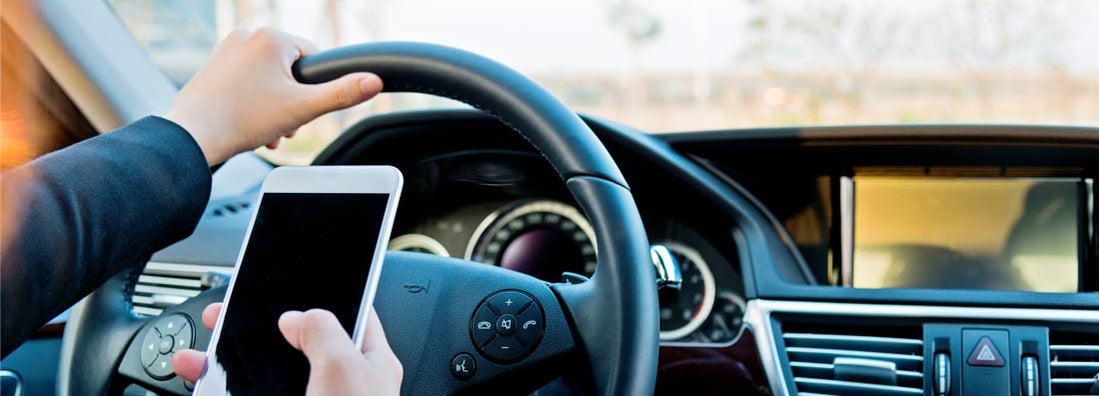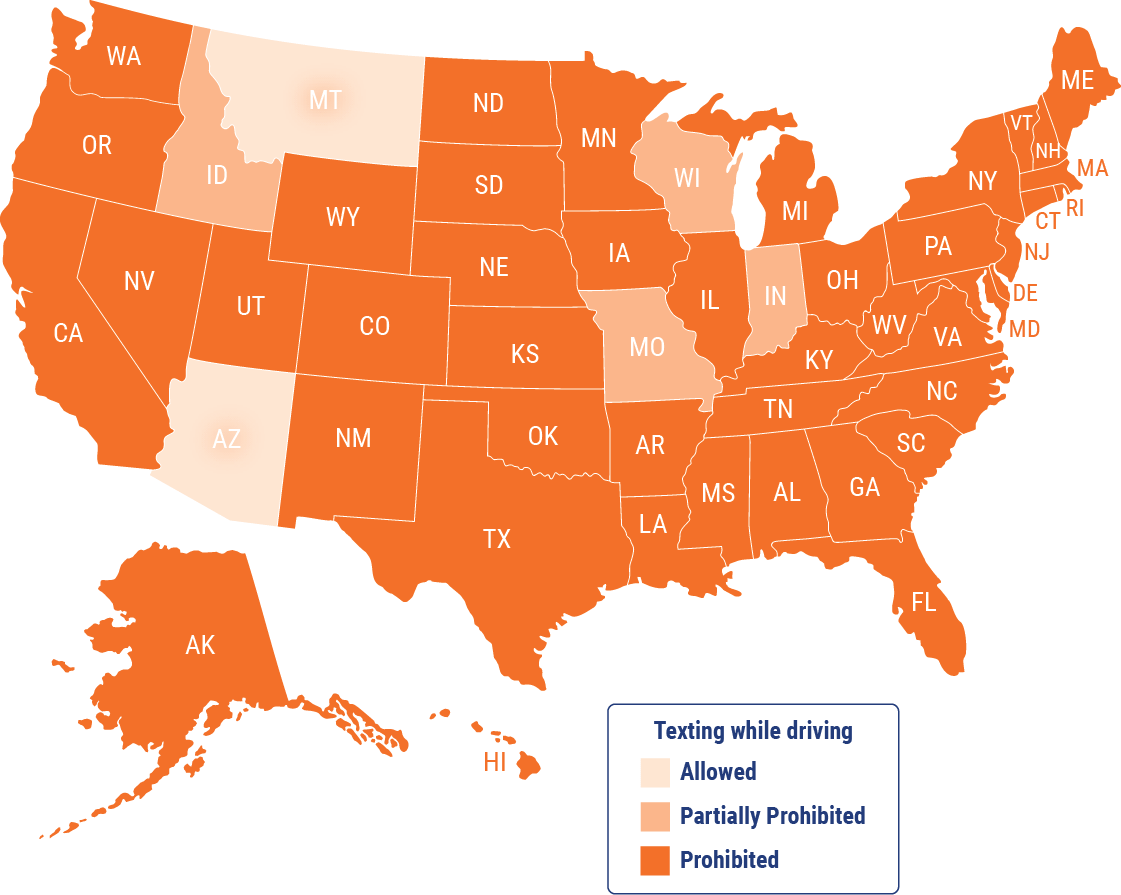Nevada Distracted Driving
(It's more than just not texting.)

There are more than 50,000 car accidents every year in Nevada. And most of these are simple distracted driving mistakes that are completely preventable.
That’s why arguably THE most important thing you can do behind the wheel is keep your hands at 10 and 2 and your eyes on the road. Always.
What Is Distracted Driving?
When it comes to distracted driving, most people think only of cell phone use. But the Nevada Department of Motor Vehicles (DMVNV) warns that “cell phones aren’t the only problem. Drivers can be distracted by eating and drinking, grooming, tuning the radio, or even talking to passengers.”
There are three types of distractions:
- Manual: anything that causes you to take your hands off the wheel, like eating, smoking, or reaching for an object
- Visual: anything that causes you to take your eyes off the road, like looking at a GPS, checking your hair in the review mirror, or looking at kids in the backseat
- Cognitive: anything that causes you to take your mind off the task of driving, like having a conversation with a passenger, going over your shopping list in your head, or daydreaming
All distractions present a hazard and should be avoided whenever possible. The DMVNV warns that handheld cell phone use is particularly hazardous because it causes all three types of distractions.
That's why Nevada state law's biggest push is against drivers on their phones. But really, it's only a small piece of the distracted driving puzzle.
Shocking Distracted Driving Statistics
You don’t have to follow the local news every night to know that distracted driving is a problem, but here are a few statistics that might help you understand just how serious it is in Nevada:
- The National Highway Traffic Safety Administration (NHTSA) states that about 20% of all car crashes involve some sort of distraction.
- A study by the University of Utah found that talking on a cell phone while driving delays a driver’s reaction times as much as having a blood alcohol level of 0.08% (the legal limit).
- Distracted driving is the number one killer of American teens.
- A study at Carnegie Mellon University found that brain power devoted to driving decreases by 40% when a driver is having a conversation or listening to music.
- Reading or sending a text message takes a driver’s eyes off the road for an average of five full seconds.
Does Nevada Have Laws against Distracted Driving?
Yes.
Nevada currently prohibits:
- All drivers from using handheld cell phones or other handheld wireless communication devices
- Text messaging and related activities (like web browsing)
Nevada compared to the rest of the US on texting and driving restrictions

Every state in the US has a law that prohibits some sort of cell phone usage except Montana and Arizona. But in 2021, newly enacted cell phone restriction laws will go into effect in Arizona.
Are There Any Exceptions to the Distracted Driving Laws in Nevada?
Yes.
The state of Nevada makes exceptions to its distracted driving laws for drivers who are:
- Using their phones to report a medical emergency, a safety hazard, or criminal activity
- Using a voice-operated GPS or other navigation system, as long as it's attached to the vehicle
- Riding in autonomous vehicles
- Using citizen band (CB) or other two-way radios that have a separate, hand-held microphone and require a license
- Active-duty law enforcement officers, firefighters, medical technicians, or other emergency personnel who are acting within the scope of their employment
- Utility workers responding to an outage or emergency who are using devices provided by their company
- Amateur radio operators who are providing communication services during an emergency or disaster
Nevada Distracted Driving Laws at a Glance
| Yes | No | |
| Is texting while driving legal? | X | |
| Can you send/receive texts at a red light? | X | |
| Is handheld device use permitted? | X | |
| Any special restriction for young drivers? | X | |
| Is headphone/headset use permitted? | X |
Is It Legal to Eat a Cheeseburger While Driving in Nevada?
Yes. But that doesn't mean you should.
Distracted driving comes in many forms, and eating a cheeseburger can be just as distracting as talking on a cell phone. In fact, the Nevada Department of Transportation says you're 1.6 times more likely to be in an accident while eating and 1.3 times more likely to be in an accident while talking on a handheld cell phone.
So, what happens if a police officer in Nevada spots you eating a cheeseburger while driving down the highway? In most cases, nothing. There's no law that says you can't eat while driving in this state.
But even legal distractions (like eating or adjusting the radio) can significantly increase your risk of being in an accident or driving erratically, so it's better to avoid as many distractions as possible. Otherwise, you might find yourself looking at a citation and the fines that come along with it.
Unless you're really in a hurry, you’re better off eating your Big Mac indoors or in the parking lot.
What's the Difference between Primary and Secondary Enforcement of Distracted Driving Laws?
Primary enforcement of distracted driving laws means the police can pull you over if they see you violating state distracted driving laws.
Secondary enforcement of distracted driving laws means the police can cite you for violating distracted driving laws only if you break another law while doing so.
Nevada uses primary enforcement.
This means that if a police officer sees you texting or talking on a handheld cell phone while driving, you can be pulled over and given a citation – even if you were in total control of your car the whole time.
What's the Fine for Distracted Driving in Nevada?
In Nevada, a violation of the distracted driving law is considered a misdemeanor. The penalties for a distracted driving citation include:
- For a first offense: $50
- For a second offense: $100
- For a third or subsequent offense: $250
And if the offense occurs in an active school zone or work zone, the fine is doubled.
The state allows you to start over with a clean slate after seven years, so if you’ve had a previous offense eight years ago, another violation would be considered a first offense. A first offense is not considered a moving violation, but subsequent offenses are.
Nevada’s fines for distracted driving compared to surrounding states

As you can see, the penalties for distracted driving in Nevada are not as harsh as in nearby states. Also, keep in mind that court costs and fees can significantly increase the amount you are expected to pay. And that isn't the only added cost you might face — which brings us to our next topic: insurance.
Does a Distracted Driving Citation in Nevada Increase Insurance Rates?
That depends.
Because a first offense isn't considered a moving violation, your insurance company may never know about your citation, so your rates won't be affected.
But if you receive an additional citation, your insurer will be informed – and they will realize that this was not your first offense. In this case, your rates will almost surely go up.
The amount of the increase will depend largely on which insurance company you use and your overall driving history, but the average rate increase in the US is about $220 a year.
And if you have a safe driver discount, you can probably kiss that goodbye. Distracted driving will almost certainly disqualify you from receiving this discount, and this can cause your rate increase to be even more painful.
What If I Drive into Another State?
Distracted driving laws vary by state, and when you cross that state line you are required to follow their laws. Claiming ignorance of the law will not get you out of a citation, so be sure to check on the current laws for any states you may be traveling through before you take your next road trip.
If a 17-year-old driver is talking on the phone using a hands-free device, this becomes illegal if they drive over the border into California, Oregon, Arizona, or Utah, where additional restrictions are placed on drivers under 18.
And if you, as an adult driver, travel across the border into Utah or Idaho, you're allowed to use a handheld device. But the question is: Why would you?
Assuming your car is already outfitted with hands-free technology, why would you take the added risk of not using it? Just because you are allowed to do something doesn’t necessarily mean you should.
What's Nevada Doing To Prevent Distracted Driving?
The distracted driving laws in Nevada are designed to reduce the number of cellphone-related car accidents. To this end, Nevada is one of only seventeen states that have instituted statewide bans on the use of handheld devices by all drivers. This law has been in effect since 2011.
And state lawmakers are currently considering a bill that will allow law enforcement officers to search a driver’s cell phone following an accident. While some are concerned that such a law would violate privacy rights, others believe it can lead to even stronger enforcement of distracted driving laws in the state.
So What Can You Do?
Quite simply, just put the phone away — even if that means in the glove compartment. The fines themselves are definitely not worth it, let alone the more serious consequences to you and others on the road. Let’s all just get where we’re going safely and save the texting until you get home.
https://dmvnv.com/pdfforms/qtdistracted.pdf
http://data-ndot.opendata.arcgis.com/pages/crash-data
https://www.leg.state.nv.us/NRS/NRS-484B.html#NRS484BSec165
